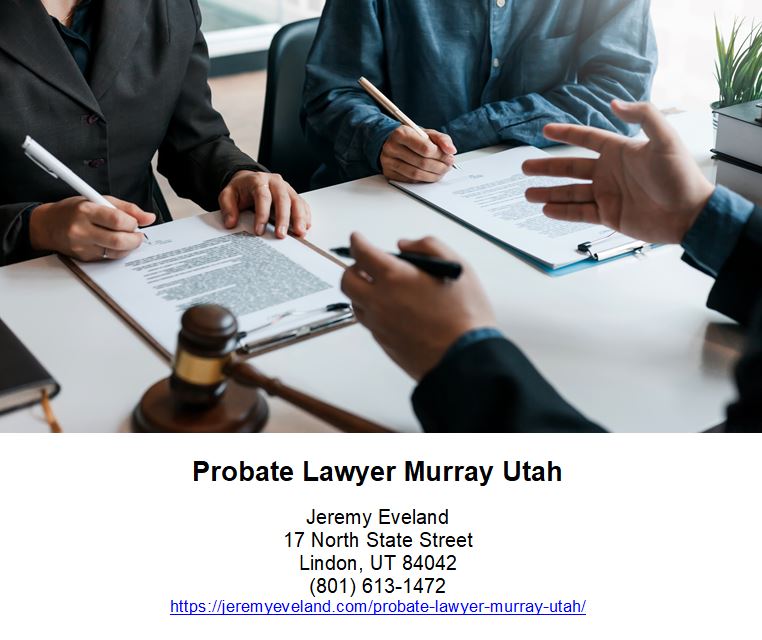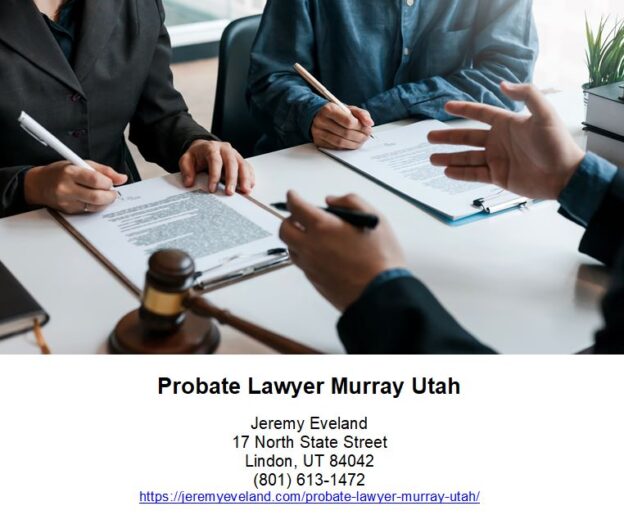-
Attorney and Counselor at Law
“Probate Lawyer Murray Utah: Your Trusted Guide to Navigating the Complexities of Estate Planning.”
Introduction
Probate Lawyer Murray Utah is a law firm that specializes in probate law. We provide legal services to individuals and families in the Murray, Utah area. Our experienced attorneys have a deep understanding of the probate process and can help you navigate the complexities of probate law. We are committed to providing our clients with the highest quality legal representation and strive to ensure that their rights are protected throughout the probate process. Whether you are dealing with the death of a loved one, or need assistance with estate planning, our attorneys are here to help.
Estate Planning Litigation Services Offered by Murray, Utah Lawyers
Murray, Utah lawyers offer a variety of estate planning litigation services to help clients protect their assets and ensure their wishes are carried out. Estate planning litigation involves the legal process of resolving disputes related to the distribution of assets, the management of trusts, and other matters related to estate planning.
Estate planning litigation services offered by Murray, Utah lawyers include:
Will Contests: Will contests involve challenging the validity of a will or trust. Murray, Utah lawyers can help clients contest a will or trust if they believe it was created under duress, was not properly executed, or was created by someone who lacked the mental capacity to do so.
Trust litigation: Trust litigation involves disputes over the management of a trust. Murray, Utah lawyers can help clients resolve disputes over the distribution of trust assets, the management of trust funds, and other matters related to trust administration.
Probate Litigation: Probate litigation involves disputes over the distribution of assets after a person’s death. Murray, Utah lawyers can help clients resolve disputes over the distribution of assets, the management of trusts, and other matters related to probate.
Guardianship Litigation: Guardianship litigation involves disputes over the appointment of a guardian for a minor or incapacitated adult. Murray, Utah lawyers can help clients resolve disputes over the appointment of a guardian, the management of a guardianship, and other matters related to guardianship.
Estate Planning Litigation: Estate planning litigation involves disputes over the creation and execution of estate plans. Murray, Utah lawyers can help clients resolve disputes over the creation of wills and trusts, the management of assets, and other matters related to estate planning.

Murray, Utah lawyers can provide experienced legal representation to help clients protect their assets and ensure their wishes are carried out. If you are involved in an estate planning dispute, contact a Murray, Utah lawyer today to discuss your legal options.
Last Wills and Testament
This is a sample of a very basic will. You should not use this – it is just to show you what they look like so you can identify one. I, [Name], of [City, State], being of sound mind and body, do hereby make, publish, and declare this to be my Last Will and Testament, hereby revoking any and all former wills and codicils by me at any time made.
I direct that all of my just debts and funeral expenses be paid as soon as possible after my death.
I give, devise, and bequeath all of my property, both real and personal, of every kind and nature, and wheresoever situated, to my [spouse/children/other], in equal shares, share and share alike.
I appoint [Name] to be the Executor of this my Last Will and Testament. I direct that my Executor shall not be required to give bond or security in any jurisdiction.
I hereby declare that if any of the above-named beneficiaries should predecease me, then the share of such beneficiary shall pass to his or her issue, per stirpes.
In witness whereof, I have hereunto set my hand and seal this [date].
[Name]
[Signature]
Intestate Succession in Murray Utah
In Murray, Utah, intestate succession is the process by which a person’s estate is distributed when they die without a valid will. This process is governed by the laws of the state of Utah.
Under Utah law, the surviving spouse of the deceased is entitled to the entire estate if there are no surviving children or grandchildren. If there are surviving children or grandchildren, the surviving spouse is entitled to one-half of the estate. The remaining half is divided among the surviving children and grandchildren. If there are no surviving children or grandchildren, the estate is divided among the surviving parents, siblings, and other relatives of the deceased.
In addition to the distribution of the estate, the surviving spouse is also entitled to certain rights and privileges, such as the right to use the deceased’s homestead for a period of time and the right to receive a portion of the deceased’s personal property.
If there is no surviving spouse, the estate is divided among the surviving children and grandchildren. If there are no surviving children or grandchildren, the estate is divided among the surviving parents, siblings, and other relatives of the deceased.
In some cases, the court may appoint an administrator to manage the estate. The administrator is responsible for collecting and distributing the assets of the estate in accordance with the laws of the state of Utah.
It is important to note that intestate succession is a complex process and it is best to consult with an experienced attorney to ensure that the estate is distributed according to the wishes of the deceased.
Estate Planning Reviews Offered by Murray, Utah Lawyers
Estate planning is an important part of ensuring that your assets are protected and distributed according to your wishes. Murray, Utah lawyers offer estate planning reviews to help you make sure that your estate plan is up to date and meets your needs.
A Murray, Utah lawyer can review your existing estate plan to make sure that it is up to date and that it meets your current needs. They can also help you create a new estate plan if you do not have one. During the review, your lawyer will look at your current assets, debts, and liabilities, and make sure that your estate plan is structured to protect your assets and provide for your family.
Your lawyer can also review your will and other documents to make sure that they are legally valid and up to date. They can also help you create a trust or other estate planning documents if needed.
Your lawyer can also review your beneficiary designations to make sure that they are up to date and that they reflect your wishes. They can also help you create a power of attorney document to ensure that your wishes are carried out if you become incapacitated.
Finally, your lawyer can review your estate plan to make sure that it is tax efficient and that it meets your goals. They can also help you create a plan to minimize taxes and maximize the value of your estate.
Estate planning reviews are an important part of making sure that your estate plan is up to date and meets your needs. Murray, Utah lawyers can provide you with the expertise and guidance you need to ensure that your estate plan is structured to protect your assets and provide for your family.
Contesting a Will in Murray Utah
Contesting a Will in Murray, Utah can be a complex process. It is important to understand the legal process and the potential outcomes before beginning the process.
In Utah, a will can be contested if the person making the will was not of sound mind, was unduly influenced, or if the will was not properly executed. In order to contest a will, the person contesting the will must file a petition in the district court in the county where the deceased person lived. The petition must include the reasons why the will should be contested.
Once the petition is filed, the court will appoint an executor to oversee the estate. The executor will be responsible for gathering all of the assets of the deceased person and distributing them according to the will. The executor will also be responsible for notifying all of the beneficiaries of the will.
The court will then hold a hearing to determine if the will should be contested. At the hearing, the person contesting the will must present evidence to support their claim. This may include testimony from witnesses, documents, or other evidence. The court will then make a decision as to whether or not the will should be contested.
If the court decides to contest the will, the executor will be responsible for distributing the assets of the estate according to the court’s decision. This may mean that the assets are distributed differently than what was stated in the will.
It is important to understand that contesting a will is a complex process and can be costly. It is important to consult with an experienced attorney before beginning the process. An attorney can help you understand the legal process and the potential outcomes.
Murray, Utah is a great place to live and work, and it is important to plan for the future. Estate planning is an important part of financial planning, and there are a variety of tools available to help Murray residents plan for their future.
One of the most important estate planning tools is a will. A will is a legal document that outlines how a person’s assets should be distributed after their death. It is important to have a will in place to ensure that your wishes are followed and that your assets are distributed according to your wishes.
Another important estate planning tool is a trust. A trust is a legal entity that holds assets for the benefit of another person or entity. Trusts can be used to protect assets from creditors, to provide for the care of minor children, or to provide for the care of a disabled family member.
Power of attorney is another important estate planning tool. Power of attorney allows a person to appoint another person to make decisions on their behalf in the event that they become incapacitated. This can be a valuable tool for ensuring that your wishes are followed in the event of an illness or injury.
Finally, life insurance is an important estate planning tool. Life insurance can provide financial security for your family in the event of your death. It can also be used to pay for funeral expenses and other debts.
Estate planning is an important part of financial planning, and there are a variety of tools available to help Murray residents plan for their future. By taking the time to create a will, set up a trust, appoint a power of attorney, and purchase life insurance, Murray residents can ensure that their wishes are followed and that their assets are distributed according to their wishes.
Business Interests and Estate Planning
Business interests and estate planning are important considerations for any business owner. Proper planning can help ensure that your business interests are protected and that your estate is managed in a way that meets your goals.
When it comes to business interests, it is important to consider the legal structure of your business. This includes the type of entity you choose, such as a corporation, limited liability company, or partnership. Each of these entities has different tax implications and legal requirements. It is important to understand the differences between them and choose the one that best meets your needs.
In addition, it is important to consider the ownership structure of your business. This includes who owns the business, how much each owner owns, and how the ownership is divided. It is important to consider the tax implications of each ownership structure and to ensure that the ownership structure is properly documented.
When it comes to estate planning, it is important to consider how your assets will be distributed after your death. This includes deciding who will receive your assets, how they will be distributed, and how taxes will be paid. It is important to consider the tax implications of each option and to ensure that your estate plan is properly documented.
Finally, it is important to consider how your business interests and estate plan will be managed after your death. This includes deciding who will manage your business interests and estate plan, how they will be managed, and how disputes will be resolved. It is important to consider the tax implications of each option and to ensure that your estate plan is properly documented.
By taking the time to consider your business interests and estate plan, you can ensure that your business interests are protected and that your estate is managed in a way that meets your goals. Proper planning can help ensure that your business interests and estate plan are managed in a way that meets your needs.
Proceedings for the Sale of Real Property in Murray Utah
Proceedings for the Sale of Real Property in Murray, Utah
This document outlines the proceedings for the sale of real property located in Murray, Utah. This also applies to the sale of probate real estate as well. All parties involved in the sale of the property must adhere to the following guidelines and procedures.
1. The seller must provide a valid deed to the property, along with any other necessary documents, to the buyer.
2. The buyer must provide proof of funds to the seller prior to the sale.
3. The buyer must conduct a title search to ensure that the property is free and clear of any liens or encumbrances.
4. The buyer must obtain a survey of the property to ensure that the boundaries are accurate.
5. The buyer must obtain a Certificate of Occupancy from the local municipality to ensure that the property is in compliance with all local zoning and building codes.
6. The buyer must obtain a copy of the deed from the county recorder’s office.
7. The buyer must obtain a copy of the title insurance policy from the title company.
8. The buyer must obtain a copy of the closing statement from the title company.
9. The buyer must sign all necessary documents and pay all closing costs.
10. The seller must sign all necessary documents and pay all closing costs.
11. The buyer must provide proof of insurance to the seller prior to the sale.
12. The buyer must provide proof of payment to the seller prior to the sale.
13. The buyer must provide proof of occupancy to the seller prior to the sale.
14. The buyer must provide proof of any necessary permits to the seller prior to the sale.
15. The buyer must provide proof of any necessary inspections to the seller prior to the sale.
16. The buyer must provide proof of any necessary repairs to the seller prior to the sale.
17. The buyer must provide proof of any necessary warranties to the seller prior to the sale.
18. The buyer must provide proof of any necessary escrow accounts to the seller prior to the sale.
19. The buyer must provide proof of any necessary financing to the seller prior to the sale.
20. The buyer must provide proof of any necessary taxes to the seller prior to the sale.
21. The buyer must provide proof of any necessary assessments to the seller prior to the sale.
22. The buyer must provide proof of any necessary transfer fees to the seller prior to the sale.
23. The buyer must provide proof of any necessary title insurance to the seller prior to the sale.
24. The buyer must provide proof of any necessary closing costs to the seller prior to the sale.
25. The buyer must provide proof of any necessary deed restrictions to the seller prior to the sale.
26. The buyer must provide proof of any necessary easements to the seller prior to the sale.
27. The buyer must provide proof of any necessary covenants to the seller prior to the sale.
28. The buyer must provide proof of any necessary liens to the seller prior to the sale.
29. The buyer must provide proof of any necessary encumbrances to the seller prior to the sale.
30. The buyer must provide proof of any necessary zoning regulations to the seller prior to the sale.
31. The buyer must provide proof of any necessary building codes to the seller prior to the sale.
32. The buyer must provide proof of any necessary environmental regulations to the seller prior to the sale.
33. The buyer must provide proof of any necessary permits to the seller prior to the sale.
34. The buyer must provide proof of any necessary inspections to the seller prior to the sale.
35. The buyer must provide proof of any necessary repairs to the seller prior to the sale.
36. The buyer must provide proof of any necessary warranties to the seller prior to the sale.
37. The buyer must provide proof of any necessary escrow accounts to the seller prior to the sale.
38. The buyer must provide proof of any necessary financing to the seller prior to the sale.
39. The buyer must provide proof of any necessary taxes to the seller prior to the sale.
40. The buyer must provide proof of any necessary assessments to the seller prior to the sale.
41. The buyer must provide proof of any necessary transfer fees to the seller prior to the sale.
42. The buyer must provide proof of any necessary title insurance to the seller prior to the sale.
43. The buyer must provide proof of any necessary closing costs to the seller prior to the sale.
44. The buyer must provide proof of any necessary deed restrictions to the seller prior to the sale.
45. The buyer must provide proof of any necessary easements to the seller prior to the sale.
46. The buyer must provide proof of any necessary covenants to the seller prior to the sale.
47. The buyer must provide proof of any necessary liens to the seller prior to the sale.
48. The buyer must provide proof of any necessary encumbrances to the seller prior to the sale.
49. The buyer must provide proof of any necessary zoning regulations to the seller prior to the sale.
50. The buyer must provide proof of any necessary building codes to the seller prior to the sale.
51. The buyer must provide proof of any necessary environmental regulations to the seller prior to the sale.
52. The buyer must provide proof of any necessary permits to the seller prior to the sale.
53. The buyer must provide proof of any necessary inspections to the seller prior to the sale.
54. The buyer must provide proof of any necessary repairs to the seller prior to the sale.
55. The buyer must provide proof of any necessary warranties to the seller prior to the sale.
56. The buyer must provide proof of any necessary escrow accounts to the seller prior to the sale.
57. The buyer must provide proof of any necessary financing to the seller prior to the sale.
58. The buyer must provide proof of any necessary taxes to the seller prior to the sale.
59. The buyer must provide proof of any necessary assessments to the seller prior to the sale.
60. The buyer must provide proof of any necessary transfer fees to the seller prior to the sale.
61. The buyer must provide proof of any necessary title insurance to the seller prior to the sale.
62. The buyer must provide proof of any necessary closing costs to the seller prior to the sale.
63
Estate Administration Services Offered by Murray, Utah Lawyers
Murray, Utah lawyers offer a variety of estate administration services to help individuals and families manage the estate of a deceased loved one. These services include:
• Probate: Probate is the legal process of administering a deceased person’s estate. This includes identifying and collecting assets, paying debts and taxes, and distributing the remaining assets to the beneficiaries. Murray, Utah lawyers can help guide you through the probate process, ensuring that all legal requirements are met.
• Estate Planning: Estate planning is the process of creating a plan for the management and distribution of your assets after you pass away. Murray, Utah lawyers can help you create a comprehensive estate plan that meets your needs and those of your beneficiaries.
• Trust Administration: Trusts are legal documents that allow you to manage and distribute your assets while you are alive and after you pass away. Murray, Utah lawyers can help you create and administer trusts, ensuring that your wishes are carried out.
• Tax Planning: Estate taxes can be a significant burden on your estate. Murray, Utah lawyers can help you plan for and minimize the amount of taxes owed on your estate.
• Guardianship: If you have minor children or other dependents, you may need to appoint a guardian to manage their affairs. Murray, Utah lawyers can help you create a guardianship plan that meets the needs of your dependents.
Murray, Utah lawyers can provide you with the legal guidance and support you need to manage the estate of a deceased loved one. With their help, you can ensure that your wishes are carried out and that your beneficiaries are taken care of.
Probate Election and Disclaimer in Murray UT
Probate is a legal process that is used to transfer the assets of a deceased person to their heirs. In Murray, Utah, probate is handled by the Third District Court. The court oversees the process of determining the validity of a will, appointing an executor, and distributing the assets of the deceased.
In Murray, Utah, the probate process begins with the filing of a petition for probate. This petition must be filed with the court and must include the name of the deceased, the date of death, and the names of the heirs. The court will then appoint an executor to oversee the probate process. The executor is responsible for collecting the assets of the deceased, paying any debts, and distributing the remaining assets to the heirs.
Once the executor has been appointed, the court will hold an election to determine who will be the administrator of the estate. This election is open to all interested parties, including the heirs, creditors, and other interested parties. The court will then appoint the administrator, who will be responsible for managing the estate and distributing the assets to the heirs.
In some cases, a person may choose to disclaim their interest in the estate. This is done by filing a disclaimer with the court. A disclaimer is a legal document that states that the person does not wish to receive any of the assets of the estate. This can be done for a variety of reasons, including if the person does not want to be responsible for the debts of the deceased or if they do not want to be involved in the probate process.
Probate in Murray, Utah is a complex process that requires the assistance of an experienced attorney. An attorney can help guide you through the process and ensure that your rights are protected. They can also help you understand the legal implications of disclaiming your interest in the estate.
Types of Trusts
Trusts are legal arrangements that allow individuals to transfer assets to a third party for the benefit of another person or entity. They are commonly used to protect assets, minimize taxes, and provide for the care of dependents. There are several types of trusts that can be used for different purposes.
Revocable Trusts: A revocable trust is a trust that can be modified or revoked by the grantor at any time. This type of trust is often used to manage assets during the grantor’s lifetime and to provide for the distribution of assets after death. The grantor retains control over the trust assets and can change the terms of the trust at any time.
Irrevocable Trusts: An irrevocable trust is a trust that cannot be modified or revoked by the grantor. This type of trust is often used to protect assets from creditors and to minimize taxes. The grantor gives up control over the trust assets and cannot change the terms of the trust.
Living Trusts: A living trust is a trust that is created during the grantor’s lifetime. This type of trust is often used to manage assets during the grantor’s lifetime and to provide for the distribution of assets after death. The grantor retains control over the trust assets and can change the terms of the trust at any time.
Testamentary Trusts: A testamentary trust is a trust that is created upon the death of the grantor. This type of trust is often used to manage assets after death and to provide for the distribution of assets to beneficiaries. The grantor does not retain control over the trust assets and cannot change the terms of the trust.
Charitable Trusts: A charitable trust is a trust that is created for the benefit of a charitable organization. This type of trust is often used to provide financial support to a charitable organization and to minimize taxes. The grantor does not retain control over the trust assets and cannot change the terms of the trust.
Special Needs Trusts: A special needs trust is a trust that is created for the benefit of an individual with special needs. This type of trust is often used to provide financial support to an individual with special needs and to protect assets from being used to pay for medical expenses. The grantor does not retain control over the trust assets and cannot change the terms of the trust.
Steps Involved in the Probate Process in Murray, Utah
The probate process in Murray, Utah is a legal process that is used to settle the estate of a deceased person. It involves the distribution of assets to the rightful heirs and creditors, as well as the payment of any taxes or debts that may be owed. The process can be complex and time-consuming, but it is necessary to ensure that the deceased’s wishes are carried out.
The following steps are involved in the probate process in Murray, Utah:
1. File the Petition: The first step in the probate process is to file a petition with the court. This petition must include the name of the deceased, the date of death, and the names of the heirs and creditors.
2. Appoint an Executor: The court will appoint an executor to oversee the probate process. The executor is responsible for gathering the assets of the deceased, paying any debts or taxes, and distributing the assets to the heirs.
3. Notify Creditors: The executor must notify all creditors of the deceased’s estate. This is done by publishing a notice in a local newspaper.
4. Collect Assets: The executor must collect all of the assets of the deceased, including bank accounts, real estate, and other property.
5. Pay Debts and Taxes: The executor must pay any debts or taxes that are owed by the deceased. This includes any outstanding medical bills, credit card bills, or other debts.
6. Distribute Assets: After all debts and taxes have been paid, the executor must distribute the remaining assets to the heirs. This is done according to the wishes of the deceased, as stated in the will.
7. Close the Estate: Once all assets have been distributed, the executor must file a final report with the court. This report must include a list of all assets, debts, and taxes that were paid. The court will then issue an order closing the estate.
The probate process in Murray, Utah can be complex and time-consuming. It is important to seek the advice of an experienced attorney to ensure that the process is handled properly.
Accounting in Probate
Probate is the legal process of administering the estate of a deceased person. This process involves the collection and distribution of the deceased person’s assets, payment of any debts, and the distribution of any remaining assets to the beneficiaries. Accounting is an important part of the probate process, as it helps to ensure that all assets are accounted for and that the estate is properly administered.
The first step in the accounting process is to identify all of the assets of the deceased person. This includes any real estate, bank accounts, investments, and other assets. Once all of the assets have been identified, the executor of the estate must determine the value of each asset. This is typically done by obtaining appraisals or other professional valuations.
Once the value of the assets has been determined, the executor must then determine the liabilities of the estate. This includes any outstanding debts, taxes, or other obligations. The executor must then determine the net worth of the estate by subtracting the liabilities from the assets.
The executor must then prepare an inventory of all of the assets and liabilities of the estate. This inventory must be filed with the court and is used to ensure that all assets and liabilities are accounted for.
Once the inventory has been filed, the executor must then prepare a final accounting of the estate. This accounting must include all of the assets and liabilities of the estate, as well as any distributions that have been made to the beneficiaries. The final accounting must be filed with the court and is used to ensure that all assets and liabilities have been properly accounted for and that the estate has been properly administered.
Accounting is an important part of the probate process and is necessary to ensure that all assets and liabilities are properly accounted for and that the estate is properly administered. It is important to work with a qualified accountant to ensure that all of the accounting requirements are met and that the estate is properly administered.
Probate Distribution Process
The probate distribution process is the legal process of distributing a deceased person’s estate to their heirs. This process is overseen by the court and involves a variety of steps.
The first step is to open a probate case. This is done by filing a petition with the court. The petition must include information about the deceased person’s assets, debts, and heirs. The court will then appoint an executor or administrator to oversee the probate process.
The next step is to identify and locate the deceased person’s assets. This includes bank accounts, real estate, investments, and other property. The executor or administrator will need to collect all of the assets and determine their value.
The third step is to pay off any debts or taxes owed by the deceased person. This includes any outstanding credit card bills, medical bills, or other debts. The executor or administrator will need to contact creditors and make arrangements to pay off the debts.
The fourth step is to distribute the assets to the heirs. This is done according to the terms of the deceased person’s will or, if there is no will, according to state law. The executor or administrator will need to contact the heirs and make arrangements to transfer the assets.
The final step is to close the probate case. This is done by filing a final report with the court. The report must include information about the assets that were distributed and any debts that were paid. Once the court approves the report, the probate case is closed and the estate is distributed.
The probate distribution process can be a complicated and time-consuming process. It is important to work with an experienced attorney to ensure that the process is handled properly and that the deceased person’s wishes are carried out.
Why You Should Hire a Probate Lawyer to Help You
When a loved one passes away, the process of probate can be a difficult and confusing time. Probate is the legal process of administering the estate of a deceased person, including the distribution of assets to beneficiaries and creditors. It is important to understand the complexities of probate law and the various steps involved in the process. Hiring a probate lawyer can help ensure that the process is handled properly and efficiently.
A probate lawyer is an experienced legal professional who specializes in the laws and procedures related to probate. They can provide invaluable assistance in navigating the complexities of the probate process. A probate lawyer can help you understand the legal requirements of the process, as well as the various options available to you. They can also provide advice on how to best manage the estate and ensure that all assets are distributed according to the wishes of the deceased.
A probate lawyer can also help you protect your rights and interests throughout the process. They can help you understand the various legal documents involved in the process, such as wills and trusts, and ensure that they are properly executed. They can also help you resolve any disputes that may arise during the process, such as disagreements between beneficiaries or creditors.
Finally, a probate lawyer can provide invaluable assistance in the event of a dispute or challenge to the estate. They can help you defend your rights and interests in court, if necessary.
Hiring a probate lawyer can help ensure that the process of administering an estate is handled properly and efficiently. They can provide invaluable assistance in understanding the legal requirements of the process, as well as protecting your rights and interests throughout the process. If you are facing the difficult task of administering an estate, it is important to consider hiring a probate lawyer to help you.
Areas We Serve
We serve individuals and businesses in the following locations:
Salt Lake City Utah
West Valley City Utah
Provo Utah
West Jordan Utah
Orem Utah
Sandy Utah
Ogden Utah
St. George Utah
Layton Utah
South Jordan Utah
Lehi Utah
Millcreek Utah
Taylorsville Utah
Logan Utah
Murray Utah
Draper Utah
Bountiful Utah
Riverton Utah
Herriman Utah
Spanish Fork Utah
Roy Utah
Pleasant Grove Utah
Kearns Utah
Tooele Utah
Cottonwood Heights Utah
Midvale Utah
Springville Utah
Eagle Mountain Utah
Cedar City Utah
Kaysville Utah
Clearfield Utah
Holladay Utah
American Fork Utah
Syracuse Utah
Saratoga Springs Utah
Magna Utah
Washington Utah
South Salt Lake Utah
Farmington Utah
Clinton Utah
North Salt Lake Utah
Payson Utah
North Ogden Utah
Brigham City Utah
Highland Utah
Centerville Utah
Hurricane Utah
South Ogden Utah
Heber Utah
West Haven Utah
Bluffdale Utah
Santaquin Utah
Smithfield Utah
Woods Cross Utah
Grantsville Utah
Lindon Utah
North Logan Utah
West Point Utah
Vernal Utah
Alpine Utah
Cedar Hills Utah
Pleasant View Utah
Mapleton Utah
Stansbury Par Utah
Washington Terrace Utah
Riverdale Utah
Hooper Utah
Tremonton Utah
Ivins Utah
Park City Utah
Price Utah
Hyrum Utah
Summit Park Utah
Salem Utah
Richfield Utah
Santa Clara Utah
Providence Utah
South Weber Utah
Vineyard Utah
Ephraim Utah
Roosevelt Utah
Farr West Utah
Plain City Utah
Nibley Utah
Enoch Utah
Harrisville Utah
Snyderville Utah
Fruit Heights Utah
Nephi Utah
White City Utah
West Bountiful Utah
Sunset Utah
Moab Utah
Midway Utah
Perry Utah
Kanab Utah
Hyde Park Utah
Silver Summit Utah
La Verkin Utah
Morgan Utah
Probate Lawyer Murray Utah Consultation
When you need help from a Probate Lawyer in Murray Utah call Jeremy D. Eveland, MBA, JD (801) 613-1472 for a consultation.
Jeremy Eveland
17 North State Street
Lindon UT 84042
(801) 613-1472
Home
Related Posts
Legal Compliance
Joint Tenancy
Strategic Business Plan
Quiet Title
Construction Disputes
Exit Strategies
Business Succession Lawyer Spanish Fork Utah
Sale of Company
Corporate Attorney St. George Utah
Asset Protection
Corporate Attorney Ogden Utah
Utah Code 76-10-2402
What Is Utah Code 34-56-101
What Is Utah Code 39-1-36(1)
What Is Utah Code 48-3a-409?
Executor Lawyer
Business Strategy and Consulting
Asset Purchase Agreement
Business Succession Lawyer Roy Utah
Corporate Attorney Sandy Utah
Limited Liability Companies
LLC Lawyer
Business Lawyer St George Utah
Estate Planning Lawyer Ogden Utah
Business Succession Lawyer Pleasant Grove Utah
Market Analysis For Business Antitrust Merger
Trustee Powers and Duties
Business Lawyer Logan Utah
Probate Lawyer Murray Utah
About Murray, Utah
Murray is a city situated on the Wasatch Front in the core of Salt Lake Valley in the U.S. state of Utah. Named for territorial governor Eli Murray, it is the state's fourteenth largest city. According to the 2020 census, Murray had a population of 50,637.
Murray shares borders with Taylorsville, Holladay, South Salt Lake and West Jordan, Utah. Once teeming with heavy industry, Murray's industrial sector now has little trace and has been replaced by major mercantile sectors. Known for its central location in Salt Lake County, Murray has been called the Hub of Salt Lake County. Unlike most of its neighboring communities, Murray operates its own police, fire, power, water, library, and parks and recreation departments and has its own school district. While maintaining many of its own services, Murray has one of the lowest city tax rates in the state.
Things To Do in Murray, Utah
Bus Stops in Murray, Utah to Jeremy Eveland
Bus Stop in Murray Central Station (Bay A) Murray, Utah to Jeremy Eveland
Bus Stop in Murray Blvd / Vine St (SB) Murray, Utah to Jeremy Eveland
Bus Stop in Murray North Station (Bay B) Murray, Utah to Jeremy Eveland
Bus Stop in Murray Blvd @ 4948 S Murray, Utah to Jeremy Eveland
Bus Stop in Murray Central Frontrunner/Trax Station Murray, Utah to Jeremy Eveland
Bus Stop in State St @ 4801 S Murray, Utah to Jeremy Eveland
Bus Stop in Murray Central Station (Bay C) Murray, Utah to Jeremy Eveland
Bus Stop in State St @ 5775 S Murray, Utah to Jeremy Eveland
Bus Stop in Murray Blvd @ 4889 S Murray, Utah to Jeremy Eveland
Bus Stop in State St @ 5525 S Murray, Utah to Jeremy Eveland
Bus Stop in State St @ 5400 S Murray, Utah to Jeremy Eveland
Bus Stop in State St @ 5905 S Murray, Utah to Jeremy Eveland
Driving Directions in Murray, Utah to Jeremy Eveland
Driving Directions from Quackenbush Legal, PLLC to 17 N State St, Lindon, UT 84042, USA
Driving Directions from Lonnie Eliason to 17 N State St, Lindon, UT 84042, USA
Driving Directions from Rulon T Burton & Associates to 17 N State St, Lindon, UT 84042, USA
Driving Directions from Gosdis Law to 17 N State St, Lindon, UT 84042, USA
Driving Directions from Miller Harrison LLC to 17 N State St, Lindon, UT 84042, USA
Driving Directions from Bibiana Ochoa, Attorney at Law to 17 N State St, Lindon, UT 84042, USA
Driving Directions from Brad Voss Law to 17 N State St, Lindon, UT 84042, USA
Driving Directions from WILNER & O'REILLY | IMMIGRATION LAWYERS to 17 N State St, Lindon, UT 84042, USA
Driving Directions from David M. Cook Bankruptcy Law to 17 N State St, Lindon, UT 84042, USA
Driving Directions from Day Shell & Liljenquist L.C. to 17 N State St, Lindon, UT 84042, USA
Driving Directions from Head Law, PLLC to 17 N State St, Lindon, UT 84042, USA
Driving Directions from Contigo Law to 17 N State St, Lindon, UT 84042, USA
Reviews for Jeremy Eveland Murray, Utah


















